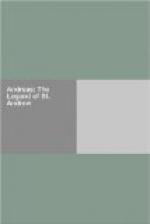It is equally impossible to determine with any certainty the date of authorship, since the poem is wholly lacking in contemporary allusions. Nor can we base any argument upon its language, since, in all probability, its present form is but a West Saxon transcript of an older Northumbrian or Mercian version. If Cynewulf flourished in the eighth century, the date of the Andreas is probably not much later. The Vercelli manuscript is assigned to the first half of the eleventh century.
[Sidenote: Sources.]
Fortunately we can speak with more assurance about the sources of the poem. It follows closely, though not slavishly, the Acts of Andrew and Matthew, contained in the Apocryphal Acts of the Apostles.[1] Like the great English poets of the fourteenth and sixteenth centuries, the poet of the Andreas has borrowed his story from a foreign source, and like them he has added and altered until he has made it thoroughly his own and thoroughly English. We can learn from it the tastes and ideals of our Anglo-Saxon forefathers quite as well as from a poem wholly original in its composition. Most clearly do we discover their love of the sea. The action of the story brings in a voyage, which the Greek narrative dismisses with a few words, merely as a piece of necessary machinery. The Old English poem, on the contrary, expands the incident into many lines. A storm is introduced and described with great vigor; we see the circling gull and the darting horn-fish; we hear the creaking of the ropes and the roaring of the waves.[2] Every mention of the sea is dwelt upon with lingering affection, and described with vivid metaphor. It is now the “bosom of the flood,” now the “whale-road” or the “fish’s bath.” Again it is the “welter of the waves,” or its more angry mood is personified as the “Terror of the waters.” In the first 500 lines alone there are no less than 43 different words and phrases denoting the sea.
[Footnote 1: Acta Apostolorum Apocrypha, ed. Tischendorf. Leipzig, 1851, pp. 132-166. (For a translation of part of the Acts of Andrew and Matthew, see Cook’s First Book in Old English, Appendix III.)]
[Footnote 2: See 369-381.]
Daybreak and sunset, too, are described with much beauty, and in one passage at least with strong imagination. We can have no doubt that the poet was a close watcher and keen lover of nature. We can imagine him walking on the cliffs beside his beloved ocean, watching for the sunrise, rejoicing in the glory of the sky,
As heaven’s candle shone across the floods.[1]
[Footnote 1: See 243.]
I have said, too, that he was a devout churchman. Many of the noble hymns and prayers with which the poem abounds are largely original, expanded from a mere line or two in the Greek. Many and beautiful are the epithets or kennings which he applies to God, taken in part from the Bible, and in part from the imagery of the not wholly extinct heathen mythology.




